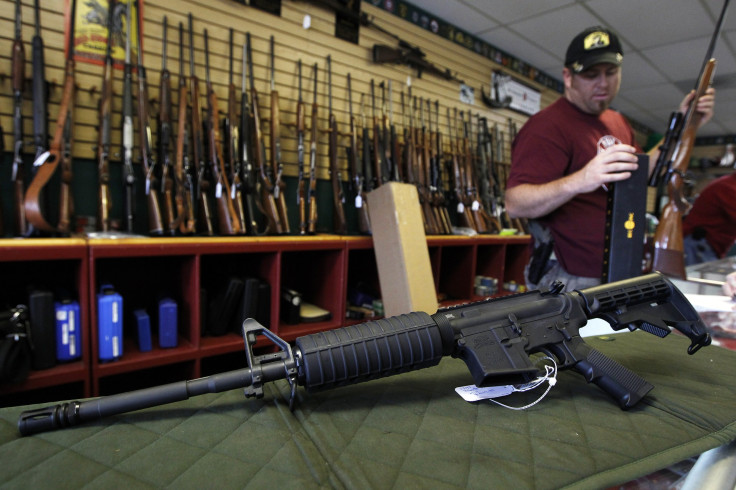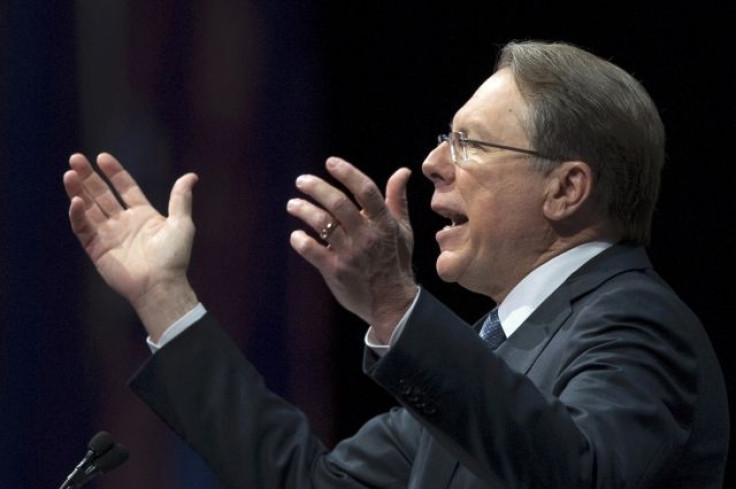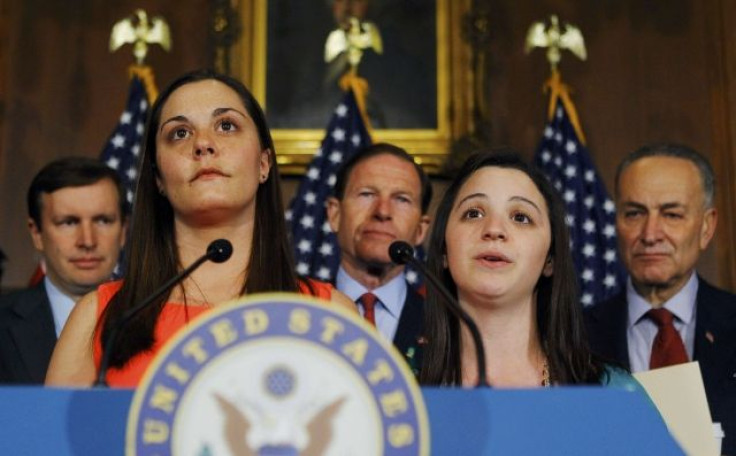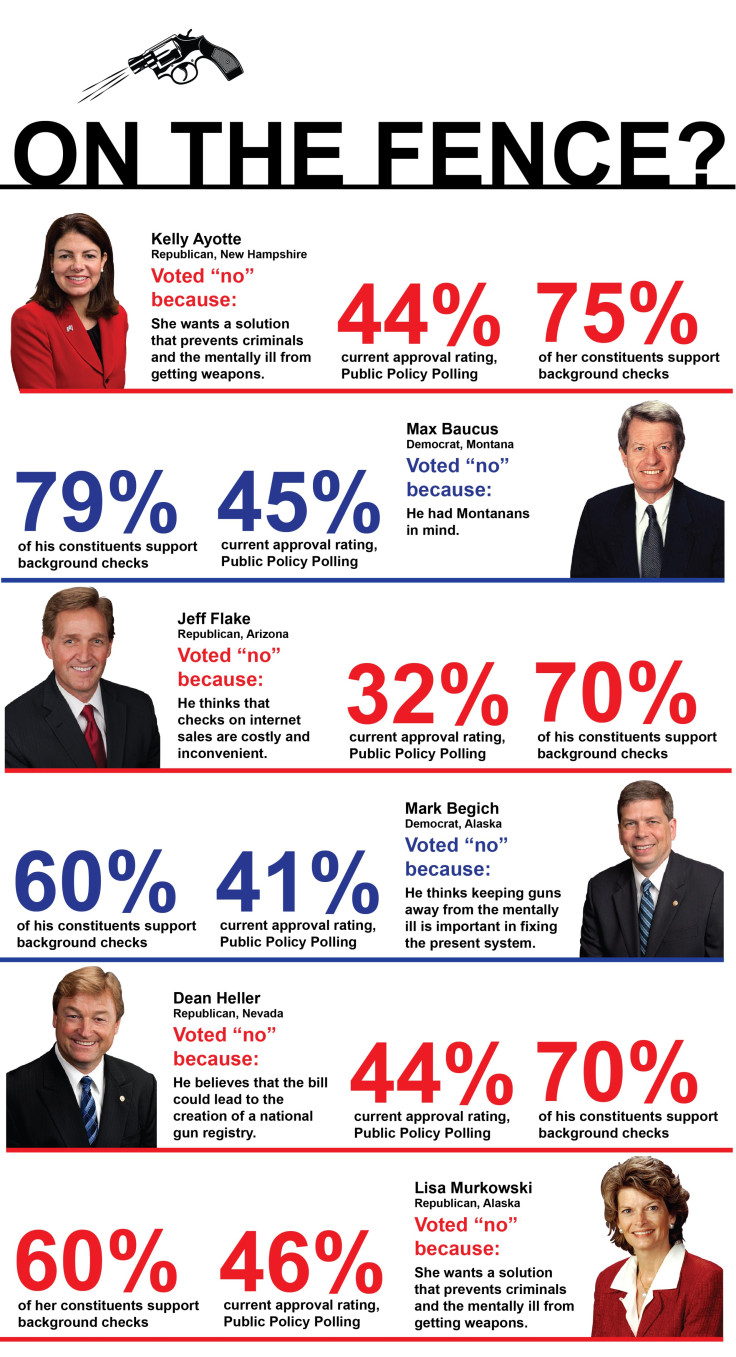Gun Control Debate: Why Manchin-Toomey Background Checks Will Never Pass The Senate

Immigration reform might be the big issue now on Capitol Hill, but gun control advocates are banking on continued public enthusiasm to revive the debate over expanded background checks, with a possible second Senate vote in the offing.
The initial measure, which would have mandated background checks for virtually all gun buyers, including those purchasing firearms at gun shows and on the Internet, got a 54-46 vote in the Senate, six votes short of the threshold to block a Republican filibuster. But recently some Senators who opposed the bipartisan bill, which polls show as overwhelmingly supported by Americans, have seen their favorability numbers plummet and felt the wrath of angry constituents at town hall meetings. This has buoyed the bill's backers and led to a growing consensus that the bill will be given a second chance in the Senate -- and this time get the half-dozen votes needed to send it to the House of Representatives, which wouldn't dare dismiss the people's obvious preference in this matter.
A tidy tale for gun control supporters, but all wrong, some political experts say. The chances that the measure sponsored by Sens. Joe Manchin, D-W.Va., and Patrick Toomey, R-Pa., will do significantly better next time is pure wishful thinking: For one thing, some watchers say, if the two sides had any common ground they would have found it already; for another, the politics of gun control may have convincingly painful emotional testimony on the side of background check advocates, but congressmen are ultimately swayed by more pragmatic concerns.
Here are six reasons why Senators who opposed the background checks bill the first time are unlikely to switch their votes:
Political Calculations Have Been Made

Pro-gun control groups have attacked Sens. Kelly Ayotte, R-N.H., and Max Baucus, D-Mont., in television and newspaper ads, criticizing them for voting against the wishes of a majority of their constituents and giving criminals a pass in opposing Manchin/Toomey.
“That's not New Hampshire common sense,” an ad run by New York City Mayor Michael Bloomberg’s Mayors Against Illegal Guns said of Ayotte. “That's gone Washington.”
In turn, this week Ayotte clarified her support for “effective background checks” but added that she doesn’t want to expand what she said is a “flawed system.” She wants it fixed, current laws enforced, and a focus on mental health.
“There are no easy answers,” she wrote in an op-ed that ran in the BedfordPatch. “Even if the proposed expansion of background checks had been in place, it wouldn’t have prevented the Sandy Hook tragedy -- where the perpetrator obtained the firearms he used by killing his own mother, who owned them lawfully.”
Like many of her colleagues, Ayotte has already done the math and studied the history. She knows that the National Rifle Association has plenty of financial power behind its threats to help defeat “anti-gun legislators” and can likely mobilize far more resources than background check supporters can. Moreover, no legislator has yet lost a seat for supporting gun rights.
“[The NRA's] Wayne LaPierre is the most powerful person on Capitol Hill,” said Tom Whalen, a political historian at Boston University. “[The Republican caucus] will not lift a finger to promote any kind of background checks. I just think it’s a pipe dream.”
Time Might Be Up

It’s been five months since 20 children and six educators were murdered at Sandy Hook Elementary School in Newtown, Conn. The chances of passing background checks would have been better if lawmakers had acted in the immediate aftermath of the incident.
“The further away you get from [Sandy Hook], the less impact you have on people,” said Harry Wilson, director of the Institute for Policy and Opinion Research at Roanoke College in Virginia. “I think [that window of opportunity] probably has closed.”
Enthusiasm Gap

A huge majority of Americans do favor passing gun background checks. In March, an ABC News/Washington Post poll found that 91 percent of Americans support mandatory checks when purchases are made at gun shows or online. But virtually everyone thinks that this vast majority is not as motivated to use gun control as a litmus test for how it will vote in an election, while NRA members are far more single-issue-oriented.
New York Mayor Michael Bloomberg and former Rep. Gabrielle Giffords, D-Ariz., who survived a 2011 gun massacre in Tucson, are among the handful of gun control advocates with the monetary power and influence to match the NRA's, but so far their threats are only that. Indeed, the Brady Campaign to Prevent Gun Violence, a well-connected nonprofit named after James Brady, the press secretary for President Ronald Reagan who was shot and permanently paralyzed when a would-be assassin tried to kill Reagan in 1981, has been trying for years to take on the gun lobby but hasn’t quite been able to pack as much punch. The Brady Campaign has been pushing for extensive background checks, and it has tried to limit the number of firearms an individual can buy at one time. It has also lobbied for a ban on assault weapons and ammunition clips holding more than 10 bullets -- an idea that also failed in the Senate last month, 40-60.
“As long as [lawmakers] believe that the NRA and other gun-rights groups can mobilize their forces and their funds and potentially find strong challenger candidates to them, they are going to resist changing their positions,” said Don Haider-Markel, a political science professor at the University of Kansas.
Congress Has Its Attention Elsewhere

Not only is it difficult to get senators to switch votes, but so many issues are brewing in Congress at the moment that their attention may already be elsewhere -- and the GOP appears happy to have buried gun control and not adding to President Barack Obama's list of achievements.
Of all the president's wish-list items, immigration reform is the one most likely to pass. Republicans already gave Obama a tax increase on the wealthy last year, and they still want spending cuts beyond sequestration before they'll do a budget deal.
“The more energy they spend on gun control is the less they spend on immigration,” Wilson said. “That is not a good idea.”
The Debt Limit Remains The House’s Priority
Even if a background checks bill squeaks through the Senate, it stands little chance in the House, which is controlled by the GOP and dominated by conservative wings of both the Republican and Democratic parties. To them, spending cuts and other fiscal issues are the main priorities; for example, the House leadership's attention recently has been taken by the question of who among the U.S. government's creditors should be paid first if there is a breach of the debt limit.
“At this point, even a victory in the Senate is largely symbolic,” said Haider-Markel. “In the House, you have even more difficulty with more Democrats in conservative districts that will be looking at 2014 and will be worried about the repercussions of a vote for background checks.”
The NRA Twists This Straightforward Bill
Manchin/Toomey is a simple bill, expanding background checks while making it a felony to create a gun registry, which the NRA steadfastly opposes. However, the NRA has engaged in what appears to be a misleading campaign to convince people that the bill will lead to a national list of gun owners.
Manchin has been pleading with congressmen and Americans at large to read the legislation for themselves. However, lawmakers like Mark Begich, R-Alaska, who arguably opposed the bill because of politic survival, and Dean Heller, R-Nev., who used the possibility of a gun registry as his ostensible reason, will need real alterations to the original measure before they'd consider a flip-flop.
Manchin is considering changes such as limiting the fees buyers pay at gun shows, fixing the language concerning Internet sales and how it applies to family members, and making mental illness provisions, but he hasn't given specifics. But that could turn the bill into something pretty useless.
Sen. Jeff Flake, R-Ariz., has said he opposed the background checks bill because of its broad definition of commercial sales, which had the potential to affect transactions between relatives. Other lawmakers want greater, but varying, efforts geared toward mental health and stiffer penalties for gun traffickers. But trying to cater to both sides has potential drawbacks. Expanding background checks and making tougher penalties for straw purchases are good ideas. However, when the NRA argues for outlawing only those purchases where authorities can prove a straw purchaser knew a customer wouldn’t pass a background check or would commit a crime, then the law could become ineffective. Authorities will need to prove intent.
“You water it down anymore, what are you going to have? Water,” Boston’s Whalen said. “It is a pretty weak gun control bill to begin with. It has to have teeth.”

Manchin and Toomey are in a difficult position. They need to change the public perception of the bill, proving to gun owners who support and listen to the NRA that the law would not usher in a gun grab by the government. If they find a way to do that, the background checks bill could be back -- possibly in redefined, and watered-down, terms.
But Roanoke's Wilson goes further: “My best guess is that this thing will not come back for an actual vote.”
© Copyright IBTimes 2024. All rights reserved.












